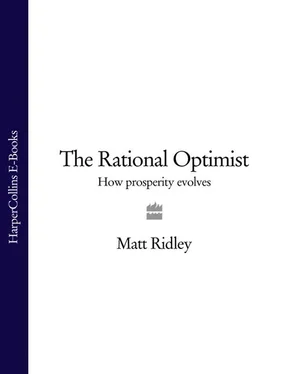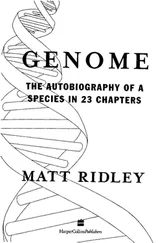Evolutionary psychologists have assumed that it is rare for conditions to exist in which two people simultaneously have value to offer to each other. But this is just not true, because people can value highly what they do not have access to. And the more they rely on exchange, the more they specialise, which makes exchange still more attractive. Exchange is therefore a thing of explosive possibility, a thing that breeds, explodes, grows, auto-catalyses. It may have built upon an older animal instinct of reciprocity, and it may have been greatly and uniquely facilitated by language – I am not arguing that these were not vital ingredients of human nature that allowed the habit to get started. But I am saying that barter – the simultaneous exchange of different objects – was itself a human breakthrough, perhaps even the chief thing that led to the ecological dominance and burgeoning material prosperity of the species. Fundamentally, other animals do not do barter.
I still don’t quite know why, but I have a lot of trouble getting this point across to both economists and biologists. Economists see barter as just one example of a bigger human habit of general reciprocity. Biologists talk about the role that reciprocity played in social evolution, meaning ‘do unto others as they do unto you’. Neither seems to be interested in the distinction that I think is vital, so let me repeat it here once more: at some point, after millions of years of indulging in reciprocal back-scratching of gradually increasing intensity, one species, and one alone, stumbled upon an entirely different trick. Adam gave Oz an object in exchange for a different object. This is not the same as Adam scratching Oz’s back now and Oz scratching Adam’s back later, or Adam giving Oz some spare food now and Oz giving Adam some spare food tomorrow. The extraordinary promise of this event was that Adam potentially now had access to objects he did not know how to make or find; and so did Oz. And the more they did it, the more valuable it became. For whatever reason, no other animal species ever stumbled upon this trick – at least between unrelated individuals.
Do not take my word for it. The primatologist Sarah Brosnan tried to teach two different groups of chimpanzees about barterand found it very problematic. Her chimps preferred grapes to apples to cucumbers to carrots (which they liked least of all). They were prepared sometimes to give up carrots for grapes, but they almost never bartered apples for grapes (or vice versa), however advantageous the bargain. They could not see the point of giving up food they liked for food they liked even more. Chimpanzees and monkeys can be taught to exchange tokens for food, but this is a long way from spontaneously exchanging one thing for another: the tokens have no value to the chimpanzees, so they are happy to give them up. True barter requires that you give up something you value in exchange for something else you value slightly more.
This is reflected in the ecology of wild chimpanzees. Whereas in human beings, each sex eats ‘not only from the food items they have collected themselves, but from their partners’ finds,’ says Richard Wrangham, ‘ not even a hint of this complementarity is found among nonhuman primates.’ It is true that male chimps hunt monkeys more than females do and that having killed a monkey, a male sometimes allows others to share it if they beg to, especially a fertile female or a close partner to whom he owes a favour. But the one thing you do not see is trade of one food for another. There is never barter of meat for nuts. The contrast with human beings, who show an almost obsessive interest not just in sharing food with each other from an early age, but in swapping one item for another, is striking. Birute Galdikas reared a young orang-utan in her home alongside her daughter Binti, and was struck by the contrasting attitudes to food sharing of the two infants. ‘Sharing food seemed to give Binti great pleasure,’ she wrote. ‘In contrast, Princess, like any orang-utan would beg, steal and gobble food at every opportunity’.
My argument is that this habit of exchanging, this appetite for barter, had somehow appeared in our African ancestors some time before 100,000 years ago. Why did human beings acquire a taste for barter as other animals did not? Perhaps it has something to do with cooking. Richard Wrangham makes a persuasive case that control of fire had a far-reaching effect on human evolution. Beyond making it safe to live on the ground, beyond liberating human ancestors to grow big brains on high-energy diets, cooking also predisposed human beings to swapping different kinds of food. And that maybe got them bartering.
As the economist Haim Ofek has argued, fire itself is hard to start, but easy to share; likewise cooked food is hard to make but easy to share. The time spent in cooking is subtracted from the time spent in chewing: wild chimpanzees spend six hours or more each day just masticating their food. Carnivores might not chew their meat (they are often in a hurry to eat before it is stolen), but they spend hours grinding it in muscular stomachs, which comes to much the same thing. So cooking adds value: the great advantage of cooked food is that though it takes longer to prepare than raw food, it takes just minutes to eat, and this means that somebody else can eat as well as the person who prepares it. A mother can feed her children for many years. Or a woman can feed a man.
In most hunter-gatherers, women spend long hours gathering, preparing and cooking staple foods while men are out hunting for delicacies. There is, incidentally, no hunter-gatherer society that dispenses with cooking. Cooking is the most female-biased of all activities, the only exceptions being when men prepare some ritual feasts or grill a few snacks while out on the hunt. (Does this ring any modern bells? Fancy chefs and barbecuing are the two most masculine forms of cooking today.) On average, across the world, each sex contributes similar quantities of calories, though the pattern varies from tribe to tribe: in Inuits, for example, most food is obtained by men, whereas in the Kalahari Khoisan people, most is gathered by women. But – and here is the crucial point – throughout the human race, males and females specialise and then share food.
In other words, cooking encourages specialisation by sex. The first and deepest division of labour is the sexual one. It is an iron rule documented in virtually all foraging people that ‘ men hunt, women and children gather’. The two sexes move ‘through the same habitat, making strikingly different decisions about how to obtain resources within that habitat, and often returning to a central location with the results of their labour.’ So, for example, while Hiwi women in Venezuela travel by foot to dig roots, pound palm starch, pick legumes and collect honey, their menfolk go hunting, fishing or collecting oranges by canoe; while Ache men in Paraguay hunt pigs, deer and armadillos for up to seven hours a day, the women follow them collecting fruit, digging for roots, gathering insects or pounding starch – and sometimes catching armadillos, too; while Hadza women in Tanzania collect tubers, fruit and nuts, men hunt antelope; while Greenland Inuit men hunt seals, women make stews, tools and clothing from the animals. And so on, through example after example. Even the apparent exceptions to the rule, where women do hunt, are instructive, because there is still a division of labour. Agta women in the Philippines hunt with dogs; men hunt with bows. Martu women in western Australia hunt goanna lizards; men hunt bustards and kangaroos. As one anthropologist put it after living with the Khoisan, ‘ Women demand meat as their social right, and they get it – otherwise they leave their husbands, marry elsewhere or make love to other men.’
Читать дальше












